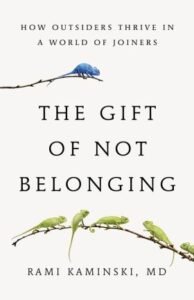The Gift Of Not Belonging by Dr. Rami Kaminski (book review).
I came across this book, ‘The Gift Of Not Belonging’, when reading an interview with its author, Rami Kaminski, in the ‘New Scientist’ magazine and realised he was describing aspects of me. I’ve always seen myself as an introvert-extravert, a mix of both. What he calls the condition of not-belonging is ‘otrovert’, people who don’t belong to any group and are uneasy being around too many people despite being strongly empathic. I’d probably go even further and say even groups where I logically should belong don’t really want me either, as my mindset doesn’t match theirs.
Although Kaminski does appear to cover it, the description should really apply to any true geek, as we don’t tend to do social media. If you feel you’re in that category, then this book is well worth your attention. See how many points match you or have confused other people. For the rest of you, it might give some indication of how we tick. We are not followers. Kaminski uses examples from his patients who have been misdiagnosed in the USA because their relatives didn’t know what to make of their unsocial’ aspects. I believe that as Brits, we simply accept the situation and move forward.
Interestingly, I found several areas where I contrasted with Kaminski’s examples. I’m not exactly a party animal anymore, but that’s more from circumstances with diabetes and needed power naps. As you people reading here realise, I’m a contrast to that because I’m a good communicator, putting ideas and information over in a way most people can understand.
Part of that is down to General Semantics and me not making an ego thing that would ring of superiority problems because I tend to lack ego in such things and see it as part of the job. Now that does unsettle people because most look from the perspective of their own attitude. I think one of the secondary things was finding groups that it would seem natural to belong to would have more people like me, but rather the reverse was true.
I’m less sure about his comment that all humans die alone. Perhaps not all humans die alone. At least in British hospitals, late at night, when it’s suspected someone is dying, a nurse will stay by the patient’s side, which happened with my dad. How many times is it reported when people die surrounded by family in the press? Do you ever question that? Watching the last breath can be pretty startling.
Kaminski goes through what is likely to happen through your life as an extrovert, which will surely have some matches from what he establishes. Quite why people think it matches other forms of mental illness beats me. At most, it may resemble the behaviour of an extreme introvert who has a strong aversion to socialising.
The thing is, we’re not even a social class, so I doubt if we’d get together to discuss this. Whether we get to the top as leaders is something I’m less sure of, as we also don’t appear to show psychopathic tendencies, which gives some ruthlessness when needed. As we can also make people feel uncomfortable but not know why, it’s hardly surprising they don’t mind us keeping to ourselves rather than socialising. I tend to find people want me for my talents more than anything else.
A lot of my personality has been revealed in this review. If you are an octovert, there is a good chance that you will find reading this book enjoyable and relatable. I’m not even sure you’ll need to do the ten-page test at the back of the book to see if you’re a match.
One thing Kaminski doesn’t do is grade being an octovert. Are we all at the same level, or do we have different levels of unsocialness? After all, it happens in introverts and extraverts. Some must surely be happier to socialise from time to time than see it as a chore. At least it’s not all down to medical health.
GF Willmetts
October 2025
(pub: Scribe Publications, 2025. 223 page small hardback. Price: varies but it is new. ISBN: 978-1-917189-22-4).
check out website: https://scribepublications.co.uk/books/the-gift-of-not-belonging


